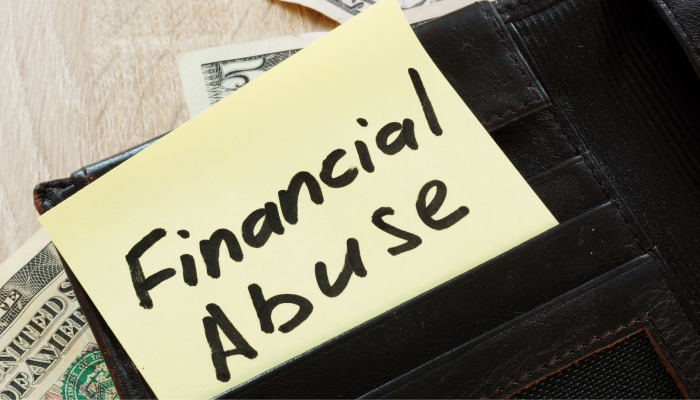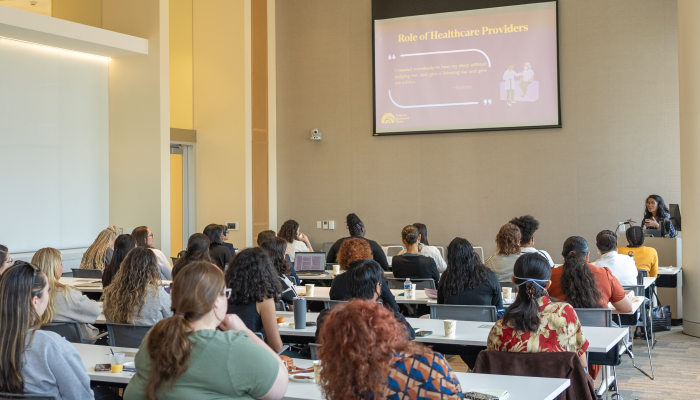When many people think about domestic abuse, they think about the more obvious signs like injuries or verbal aggression. But abuse is about power and control. So while any abusive tactics can have an immense economic impact for survivors, like in time away from work or money spent to deal with the abuse, often abusive partners specifically try to harm a survivor’s finances to control them.
Learn about financial abuse red flags and how these tactics impact survivors.
Financial Abuse Red Flags
Financial abuse can present through a range of tactics, but essentially are ways that an abusive partner can control someone through money. These red flags can indicate financially controlling or abusive behaviors:
Does your partner…
- Limit your access to money?
- Not share information about household finances?
- Force or pressure you not to pursue work or professional opportunities?
- Prevent you from going to work or going to study?
- Force or pressure you to work in a family business for little or no pay?
- Harass you at your workplace or place of study to get you in trouble?
- Prevent you from going to interviews or applying for jobs (sabotage childcare arrangements, transportation, etc.)?
- Put bills in your name that you don’t have control over paying?
- Use your credit cards without permission?
- Not allow you access to shared accounts or accounts for the home?
- Lie about paying bills?
- Pressure you to do things you don’t want to do in order for them to give you money or pay for things?
Many people are uncomfortable talking about money even within their relationships. But if you or someone you know answered yes to any of the above questions, reaching out to professionals can help you get a handle on what is going on.
Intersecting challenges of financial abuse
Having the financial footing to seek safety is often critical for survivors to have independence. Ramona Peralta, Manager of Family Wellness at the Congreso de Latinos Unidos Latina Domestic Violence Program, said, “We’ve seen survivors with no income or damaged credit due to an abuser’s efforts to limit their economic freedom and independence.” These tactics, combined with other financial challenges like needing to find a job, having student or medical debt, or paying for childcare can make navigating resources for help complicated.
And nearly all survivors of domestic violence experience financial abuse. One recent study found that survivors of color, and particularly Black and Brown women, had fewer financial resources than White survivors. It also found that survivors with fewer financial resources were more likely to return to an abusive partner.
Financial abuse complicates leaving
The extent of financial abuse is often revealed after a survivor has left their abusive partner. Marcella Nyachogo, Program Director of the Lutheran Settlement House Bilingual Domestic Violence Program, described the experience of a client who learned her husband purchased a car in her name without her knowledge: “The car was re-possessed, which meant that she kept being denied when applying for housing because the repossession was showing up on her credit.”
Programming at Lutheran Settlement House acknowledges that without assistance, survivors may find navigating financial challenges overwhelming. Nyachogo added, “Our economic justice group aims to connect survivors with experts in financial management to support survivors to rebuild financially after the long-lasting effects of domestic violence.”
Financial abuse is both complicated and common. Reaching out for help can be a lifeline to getting back on track. Learn about resources for getting and giving help below.
If you or someone you know is experiencing domestic violence
Get help for yourself or help someone else experiencing domestic violence or sexual assault.
- Connect with a counselor to discuss economic justice programming from Lutheran Settlement House.
- Learn about housing, workforce, or education programs from Congreso de Latinos Unidos.
- For information about how survivors could repair their credit, build financial resources and more, contact Clarifi for financial counseling.
- Community Legal Services also offers information and resources about debt and consumer rights.
- Get free financial counseling at Financial Empowerment Centers or help applying for public benefits.
If you want to support survivors
- Share resources with your communities about homelessness, food access, and rights for survivors of domestic violence.
- Normalize talking about money! It’s easier for people to reach out for help when they feel comfortable talking about what is happening to them.




